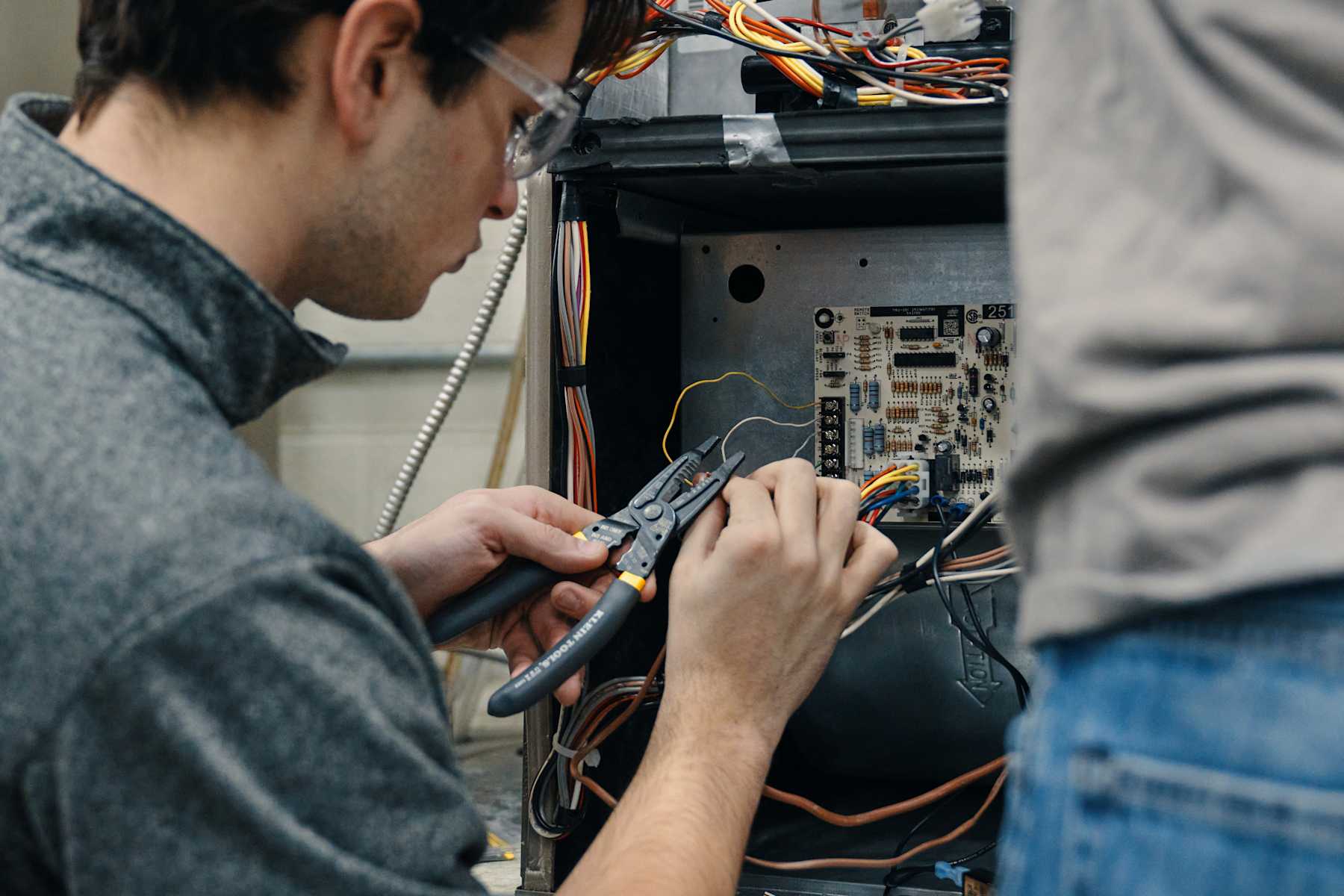Trade School vs. Community College vs. College: Core Differences
Learn the difference between college, trade school and community college and how to make the right choice for you! Explore your options here.
Key Points
You see them in office buildings, schools, hospitals and just about any indoor space that requires heating, cooling and refrigeration. They may have even visited your home!
HVACR technicians are essential workers. Without proper heating or cooling, people could experience unsafe conditions. Food could spoil. Medicine could be damaged. Lifesaving equipment and items like a human heart that’s being stored for a transplant could be destroyed.
Learn more about HVACR technicians, including their job description, education requirements, salary info and more.
HVACR stands for heating, ventilation, air conditioning and refrigeration.
Typically, an HVACR technician will train in all the above areas. They might work on a variety of technologies each day, from a heater/cooler to a commercial refrigerator. They may also specialize in installing, maintaining or fixing specific types of equipment.
HVACR technicians work on the machines that control air quality and temperature indoors, including refrigeration, heating, cooling and ventilation systems. Some technicians specialize in specific areas, like solar panels, commercial refrigeration or radiant heating systems.
HVACR technicians may travel to multiple clients within a single day. Others work on projects as part of larger teams that can include electricians, plumbers, boilermakers and sheet metal workers.
A typical day of HVACR work might include the following duties:
HVACR technicians are on their feet for much of their workdays, and they use their hands to get the job done. The BLS reports today’s HVACR employers prefer candidates who’ve completed postsecondary education or an apprenticeship.
HVACR techs must be certified to handle, work with or buy refrigerant. There may also be licensing and background-check requirements for this field.
In addition to the proper education, training and licensing, HVACR technicians typically use these skills:

One advantage of going to an HVACR school is that you can learn and sharpen these skills during your training.
Wondering whether training to become an HVACR technician fits you? Consider these benefits and challenges.
As Jason Freeman, Operations Manager at Technical Hot and Cold, explains, “The career path with Technical Hot and Cold can go every which way, which is exciting. (Technicians) come in, they can go into industrial, they can go into residential, they can go into commercial. In those paths, we’d like to see them well-rounded within a couple of years to be a full-on senior technician. And we’d like to get them on the road from there.”
You can train to become an HVACR technician in less than a year at Universal Technical Institute (UTI). Here are the steps you can take to begin the journey toward an HVACR tech career.1
As mentioned, the BLS reports that most employers prefer candidates who have completed training or, at the very least, an apprenticeship. Training can provide safety knowledge, technical and equipment knowledge and other skills that can help prepare students to enter the field.
In UTI’s HVACR program, you can learn skills that include:
According to Jessica Hart, a recruiter at Thornton & Grooms Residential Heating, Cooling and Plumbing, completing a training program “is always going to put you a step ahead of somebody else. It shows you can learn.”
Different states may have specific licensing and HVACR certification requirements. You can typically find these by searching online for “HVACR requirements in (state)”.
A common HVACR technician certification is the Section 608 Technician Certification, which is required for technicians who dispose of, maintain, repair or service equipment with refrigerants. If you work in the refrigeration side of HVACR, you’ll likely need to get this certification. An HVACR training program that covers refrigeration fundamentals and commercial refrigeration can help prepare you to test for this certification.
You can check job descriptions in different states while you’re training, so you can research what’s required to apply. You can also talk with your instructors or reach out to Career Services for more information on licensing and/or certification requirements.
Program graduates are ready to apply for positions in the field. Students can connect with Career Services, which can help them find roles that match their skill sets. Most of our grads start out in entry-level roles, but as with any industry over time, they may be able to advance in their HVACR careers with experience and hard work.77
Examples of HVACR positions include:
According to the Bureau of Labor Statistics (BLS), the median annual salary for heating, air conditioning and refrigeration mechanics and installers in the United States was $57,300 in May 2023.58 This means half earned more and half earned less. Keep in mind, that salary depends on several factors, including experience, employer, demand and cost of living in the area.
HVAC stands for heating, ventilation and air conditioning, while HVACR stands for heating, ventilation, air conditioning and refrigeration.
Most employers require their technicians to obtain licenses needed to handle refrigerant, and a majority of people who train to enter this field typically learn refrigeration skills. Therefore, these terms are often used interchangeably.
As energy efficiency standards evolve and new residential and commercial building continue to be built across the U.S., the call for skilled HVACR technicians will likely remain. Not to mention, HVACR systems are used year-round in nearly every state, making this an important role!
HVACR technician work is cool (literally!) because you get to work with your hands in a physical job while you bring joy and relief to customers’ lives almost every day.
If you’re interested in training to become an HVACR tech, we offer the program at several campus locations. Request info, and we’ll send you details on start dates, course descriptions and more.
Program coming to Sacramento and Orlando campuses.
Universal Technical Institute of Illinois, Inc. is approved by the Division of Private Business and Vocational Schools of the Illinois Board of Higher Education.